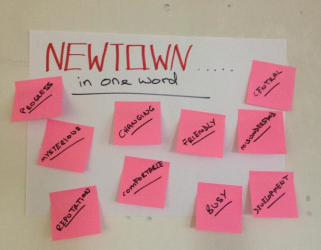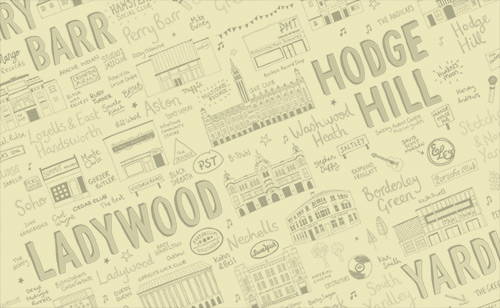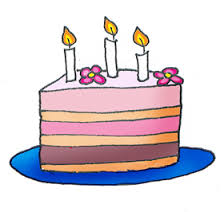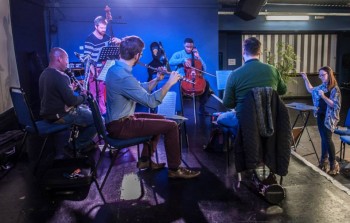Written by Kirsty Devaney, Composer for Newtown
It is an exciting time for the for-Wards composers! We have had two workshops with the musicians so far and the pieces are starting to come together. My piece is based on the community session I had with members of the Newtown community. Composing this piece of music has had a number of challenges for me:
1) Using field recordings in the music
During the community session we recorded different sounds from the area and these are going to be used in the performances. I have written a lot of music for musicians before but I have to admit I am rather traditional and do not get on well with technology! A lot of composers today may use elements of technology when composing which is really exciting, but I have never felt the need to venture into the music technology world before. This project has taken me out of my comfort zone and I have had to learn about how I can combine my own skills in writing for musicians with a new skill of integrating the field recordings.
I have approached the field recordings in two ways in the music:
1. I have layered the recordings with the instruments. The sounds from recordings are reflected and manipulated in the instrumental parts
2. I have created ‘windows’ in the piece for the field recordings to come through and stand alone in between the instrumental music.
2) Writing a piece of music that last 10 minutes
A lot of commissions or projects I have worked on have often required me to compose a between 3-5 minutes long, however for-Wards have given us a full 10 minutes! This has been a challenge for me because the longest piece I have written before is 8 minutes (and the music was slow). 10 minutes is a lot of music and takes a long time to compose considering it may take 2 hours to write 20 seconds of music…
Normally I compose by having a general idea of the shape of the piece and then I start at the beginning. The music is then taken on a journey and I finish with the ending. There are a lot of alterations to the music along the way but I tend to work relatively instinctively and intuitively. Because 10 minutes is much longer I found I can’t rely purely on intuition and I have had to make a more solid plan to the piece. I have done some listening to other pieces that last 10 minutes to help get some ideas of how to structured the music.
3) Representing Newtown in music
During the field recording workshops the aims were to record sounds that reflected the area, however, in reality this is a really hard task! What makes a sound unique to an area? Some of the sounds I had recorded may not be sounds that only reflect Newtown, for example traffic sounds can be found in most places, especially in cities. So what do these sounds mean to the participants? They chose these sounds as they felt it was important to their community. Does it matter that the sound of traffic can be heard elsewhere? Personally I valued every suggestion the participants came up with but what was important to me was why they felt a sound reflected Newtown. The conversations I had with the participants helped inform the piece and gave me ideas of how I can truly reflect the area of Newtown into a piece of music. Participants described Newtown in a number of words, words which I thing also have musical meaning:
Layers
Changing
Friendly
Misunderstood
4) Composing music for the workshops
What has been fantastic in the project is that we have had 2 ‘workshops’. Normally as composers we have ‘rehearsals’ where we take a complete, or nearly complete piece of music to be rehearsed. In these rehearsals small changes can be made (such as changes in speed or volume) but the piece is not normally changed very much. In these workshops I have taken very initial sketches and ideas that are not complete in anyway shape or form. This is quite scary as you are potentially opening yourself up to criticism, and us composers can be quite vulnerable creatures. The ensemble have been lovely and very supportive of our initial ideas. Even when something wasn’t working in the music they were happy to offer suggestions and try out new ways of playing. After workshop 1 I completely rewrote my first sketch so that it was easier to play. It now looks very different on the page but doesn’t sound that much different in performance. This was done as a result of having a workshop and the musicians suggesting alternatives. This project highlights the importance of finding the right musicians to work with – ones that are open to new ideas, believe in what you are doing, offer helpful suggestions and are supportive.
5) Balancing my own musical interests with the purpose of For-Wards
As a composer I will naturally start imposing my own style interests on a piece of music I am writing. Is this a bad thing? The project is about engaging communities and them having an impact on the piece of music that will reflect their area. Do I then need to remove myself from the equation and compose a piece purely base on the community groups and field recordings? Is it possible to remove my own musical interests? I don’t think it is. Even when selecting which part of the field recordings to use and where to use them in a piece is a decision that I, as the composer, have made. I didn’t record the sounds but I choose what goes in and what stays out.
I believe composing is all based on decision making (e.g. should it be loud or quiet? How should it start? Should it be quicker?) and the participants can help me come to some decisions about the music but not all of it. I think my role was to listen to the members of the community and then interpret the comments, which I then can form into a new piece of music. The community group definitely had an impact on the piece. Without them the piece would have been very different! However the music definitely has my own interests as a composer. I am not trying to reproduce an accurate musical representation of the area, but instead show Newtown through my own eyes (or ears) and my own interpretations that came from members of the community. I think it is this that makes the work a piece of art rather than a pure documentation of the area.




